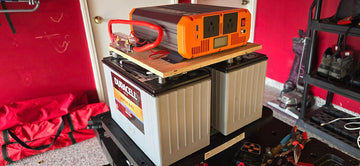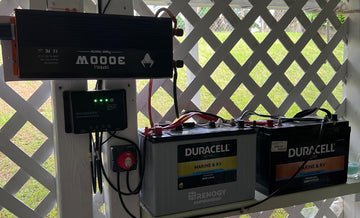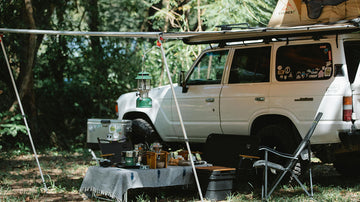Do you have an RV and find that you can't use AC appliances when you're off the grid? Then you may need an RV inverter or converter. Like most RV owners, you may not understand the difference between them. This article will help you comprehensively understand inverters and converters to make outdoor adventures more comfortable.
Two types of electricity are available for RV electrical systems: alternating current (AC) and direct current (DC).
AC power in RVs
In alternating current (AC), the direction of the current changes periodically, usually several times per second. This change in direction makes it easy to switch between different voltages, which facilitates transmission over long distances. AC is most commonly standardized at 120V and is the primary source of electricity for residential and commercial use. Most homes and businesses use AC as their electrical outlet.
In an RV, alternating current (AC) usually comes from a shore power connection at a campsite or a generator inside the RV. Once AC power is available, you can use the outlets in your RV to power a variety of AC appliances, such as televisions, microwaves, air conditioners, and other devices.
DC power in RVs
However, some caravan appliances and equipment, such as lights, water pumps, and fans, still have DC power. DC electricity flows in a constant direction, always from negative to positive, so it can be stored in batteries for use now or later.
When your RV is off-grid and relying on a battery pack for power, you are using DC power, which is characterized by a stable DC voltage, most commonly 12 V. However, 24 V DC is also used in some larger RV power systems.
AC and DC power can be converted to each other to suit different applications. AC to DC conversion is mainly used for battery-operated electronic equipment. DC to AC conversion is mainly used to power AC appliances and equipment in RVs.

What is a converter
A converter is a device that changes the voltage of a power supply. It can convert the type of current from AC to DC or from DC to AC. A converter essentially adjusts the power to a level that is compatible with a particular device or appliance.
An RV converter plays an important role in the RV electrical system by maintaining battery power and helping to convert AC power to DC power for use in the RV. When connected to shore power, an RV converter converts 120V AC to 12V DC, which is then used to power RV appliances and charge batteries.
What types of converters are there?
Converters can be divided into different categories based on their input and output voltages:
AC to DC Converter: This type of converter is best known as a rectifier and is used to convert AC power from shore power or a generator into DC power suitable for charging DC equipment and batteries in the caravan. The role of the rectifier is to ensure that a steady supply of power is available to the 12V DC appliances in the caravan.
DC to AC Converter: A DC to AC converter, also known as an inverter. The function is to convert the DC power supplied by the RV battery pack into AC power suitable for use by AC appliances and equipment in the RV.
AC to AC Converter: An AC to AC converter is commonly referred to as a device that is capable of receiving an AC voltage and then outputting an AC power source of a different voltage, frequency, or phase. It is also known as an AC voltage regulator.
DC to DC converter: Used to convert the voltage of a DC power supply to another voltage, this converter is also known as a chopper.
What is an inverter
An inverter, on the other hand, is a special type of converter that converts DC power into AC power. RV inverters play a key role in converting DC power (from batteries or solar panels) to AC power, allowing you to use regular household appliances in your RV while living off the grid.
Related: Read this article to learn about the different types of RV inverters.
Inverters allow you to run AC appliances there:
- TV
- Coffee maker
- Microwave oven
- Fridge
Inverters are not essential equipment for RVs. But they are important for those who want to stay comfortable at home while exploring the great outdoors. Inverters are now affordable, come in a variety of sizes, and are relatively easy to integrate into your electrical system.
Differences between inverter and converter
The basic difference between an inverter and a converter is their function. A converter changes the voltage of a power source and can convert AC to DC or DC to AC. An inverter changes the direction of the current in a power source, converting DC to AC.
They also differ in their applications. Converters are used in a wide range of applications, from electronic devices to electric vehicles, to regulate voltage levels or convert current types. Inverters are used specifically where AC power is needed but only DC power is available, such as renewable energy systems, backup power, and electric vehicles. For example, someone who spends a lot of time in an RV needs an inverter to power appliances on the RV's battery bank. But they also need a converter to charge the caravan's battery pack.
In practice, depending on the specific needs and the design of the power system, the appropriate type of inverter or converter can be selected to perform the required power conversion function.

Choosing the right inverter or converter for your RV
Choosing the right inverter or converter means not only understanding their differences but also matching the right unit to your specific needs and the electrical design of your vehicle.
Assess your power needs:
Determine the type of equipment to be powered: do you need AC or DC power? Understanding the power requirements of your equipment is the first step in selecting inverters and converters.
Consider power capacity:
Calculate the power of the equipment to be powered and make sure the inverter or converter you choose can handle the total power load of all the equipment you plan to use at the same time. If you need to convert from one DC power source to another, make sure the converter can support the required voltage levels and current requirements.
Compatibility with the RV electrical system:
Check the compatibility of the inverter or converter with the vehicle's electrical system. This includes checking voltage and current specifications to ensure safe and efficient operation.
Safety and quality:
Choose an inverter or converter that meets safety standards to ensure there are no circuit problems or safety hazards during use. It is best to purchase reliable brands and high-quality equipment to ensure long-term stable performance and reliability.
Portability and installation:
If you need to move the inverter or converter inside or outside the vehicle, consider a portable unit and make sure it is easy to install. If you choose a fixed installation, make sure it can be easily integrated into the vehicle's electrical system. Some units may require professional installation; consider the installation process and whether additional equipment (such as wiring or fuses) will be required. Correct installation and regular maintenance of converters and inverters are essential to achieve optimum performance and prevent damage to your caravan's electrical system. Following the installation instructions supplied with the converter or inverter will help ensure a safe and effective installation.
Regular maintenance of converters and inverters is also important. Here are some steps to follow:
- Check the connections and wiring for signs of wear.
- Inspect the batteries for signs of corrosion or damage.
- If you find any problems, address them immediately to avoid further damage to your RV's electrical system.
- Proper maintenance of your converter and inverter will ensure that you have a stable power source throughout your RV trip.
Do I still need a converter if I have an inverter?
This depends on your specific power conversion requirements. An inverter usually meets the need to convert DC to AC and can provide you with the power you need for AC appliances and equipment. On the other hand, a converter is the basic device that converts AC power directly into usable DC power.
There are some situations where you may need to consider using both an inverter and a converter:
Specific power needs: If you need to use devices of different voltages or frequencies simultaneously in your vehicle, you may need to use inverters and converters to match the power needs of these devices.
High power needs: In some cases, a specialized converter may be more efficient than an inverter for a particular type of power conversion, especially if you need to convert from one DC power source to another.
Versatile needs: Some converters have special features, such as voltage stabilizers or filters, that provide a more stable and cleaner power output, and these features may be useful in certain situations.
Which is better, an inverter or a converter?
An inverter is ideal when it is necessary to use standard household AC equipment in the vehicle, such as charging a laptop or running power tools that require AC input. A converter is needed to power or charge devices that require a different DC voltage than that provided by the vehicle's electrical system.

















